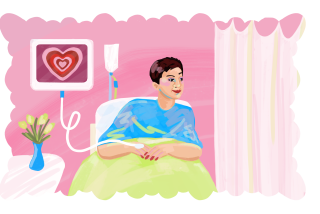Op-Ed: I had a health crisis in France. I’m here to tell you that ‘socialized medicine’ is terrific
- Share via
On Sunday, March 29, 2015, two days after my 54th birthday, I came very close to dying. I was sitting in an armchair in my Paris apartment, reading a newspaper, when I became dizzy. The next thing I knew, my heart was beating violently. When the paramedics arrived, it was racing at 240 beats per minute.
I was taken to Lariboisière, a major hospital in the north of Paris. In the intensive care unit, I learned that I had been born with a defective aortic valve. Basically, I’d been walking around my entire life with a ticking time bomb in my chest. How could I not have known? In high school, I ran track and played football; every summer, my wife and I took long hikes in the Swiss Alps. But an experienced nurse was not surprised. “With your condition,” she said, “the first symptom is often sudden death.” OK, I replied, what’s the second symptom?
So began my sojourn in the French healthcare system. In the United States, opponents of the Affordable Care Act often raise the nightmarish specter of European “socialized medicine.” For what it’s worth, here is a brief account of my experience with a single-payer system in the face of a life-threatening crisis.
Granted, it’s taxes that make such low out-of-pocket costs possible. My individual burden, however, is far more reasonable than an American might assume.
On March 31 of last year, the morning of my second full day in the ICU, I was chatting with my wife, Dorli, when I became dizzy again. This time, my chest was plastered with electrodes and the heart monitors unleashed a screaming electronic alarm. Dorli was hustled out. Someone tore open my hospital gown. A doctor stood over me, the defibrillator raised in his hands. I felt like I was in one of those hospital shows I almost never watch. I thought the doctor was about to yell “Clear!” or whatever one yells in French when, suddenly, my heart, of its own accord, calmed down. The roomful of cardiologists stared at me with a mix of empathy and professional curiosity.
I spent a total of 15 nights in intensive care units while a team of cardiologists put me through a battery of tests and tried to determine how best to treat my case. In addition to the tachycardia (accelerated heart rate) and the leaky aortic valve, the aorta itself was overgrown. I would need open-heart surgery.
On May 11, 2015, Dr. Emmanuel Lansac of the Montsouris Institute performed the six-hour operation, sewing my valve into shape and replacing a chunk of my aorta with a synthetic tube. The day after, I asked Dr. Lansac how weird my problem had been, on a scale of one to ten. He replied: “About a nine.”
After eleven days, I was transferred to a clinic for patients recovering from open-heart surgery. The grounds looked like a Monet painting. At any given time, there are about 65 patients at the clinic undergoing tests, monitoring and gentle exercise. Among my fellow cardiac cases, I met an arts administrator, two taxi drivers, the British former CEO of an airline and patients from France’s former colonies in Africa, the Caribbean and Asia, including a Vietnamese history teacher who became my regular chess partner. And then there was me, an African American writer who is not even a French citizen but a long-term official resident. All of us, regardless of class, religion, national or ethnic origin, received the same top-notch treatment.
Let’s get to the bottom line. In addition to my surgery, I underwent an MRI, had a probe inserted in my upper thigh and extended into my heart, twice had a camera shoved down my throat to take photos of my valve, and more blood tests, electrocardiograms and sonograms than I can count. For all this, I was charged nothing.
I did have to pay for my hospital beds, TV, telephone, WiFi and meals. I spent a total of 47 nights in hospitals and rehab. During the second half of my stay at the Grands Prs, I switched from a double room to a single so that I would have more privacy to write. Naturally, that was a bit more expensive. In the end, this entire ordeal set me back about 1,300 euros, or $1,455.
Granted, it’s taxes that make such low out-of-pocket costs possible. My individual burden, however, is far more reasonable than an American might assume. I pay an annual income tax of about 23%. All things considered, that’s fine by me.
I sometimes wonder how my health crisis would have played out had I returned to America instead of deciding to stay in Paris more than 20 years ago. Me, a journeyman writer with no university or corporate insurance coverage. Would I have been kept under observation in intensive care for two weeks? Before Obamacare, my valve problem could have been considered a “pre-existing condition,” allowing insurers to deny me support for the surgery.
Of course, I will never know what would have happened had I chosen to settle in my native country instead of in France. But the choice I made might well have saved my life.
Jake Lamar is the author, most recently, of the play “Brothers in Exile” and the novel “Postrit.”
Follow the Opinion section on Twitter @latimesopinion and Facebook
MORE FROM OPINION
It may be time to panic over Trump’s personnel picks
Coping strategies against creeping authoritarianism
More to Read
A cure for the common opinion
Get thought-provoking perspectives with our weekly newsletter.
You may occasionally receive promotional content from the Los Angeles Times.










